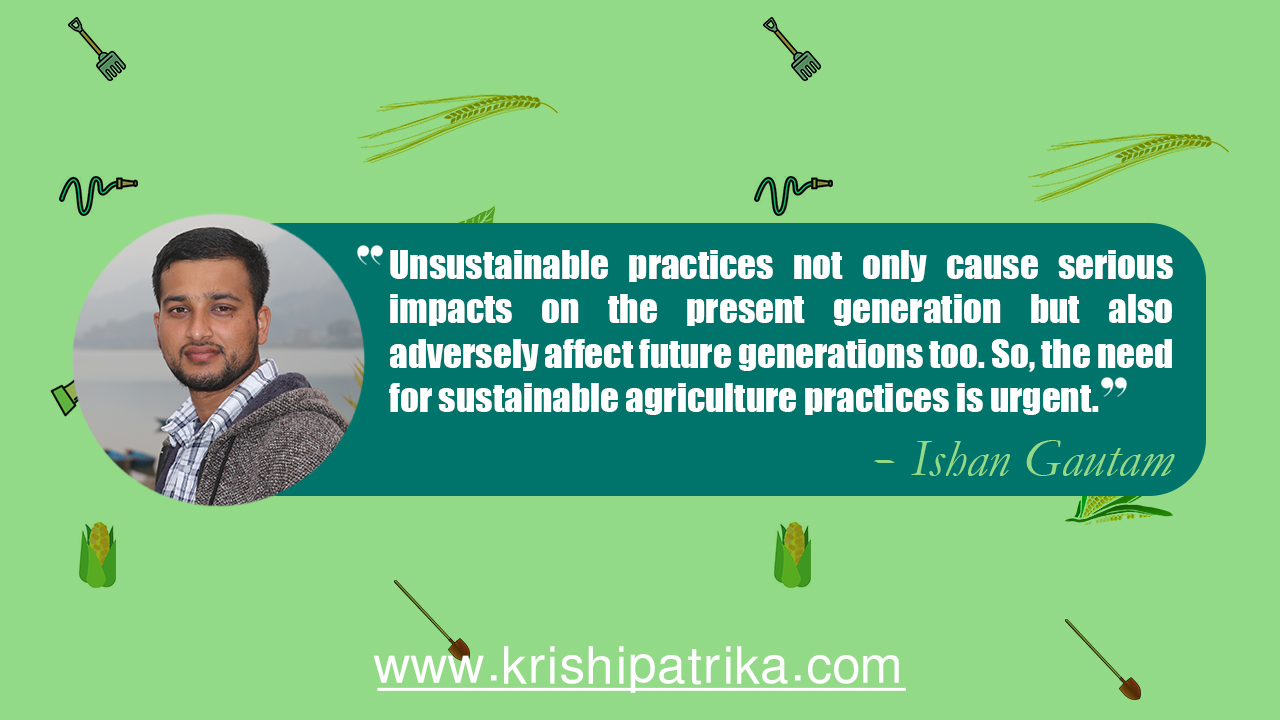
Agriculture is the world’s largest industry where millions of people are practicing it for ages and producing agricultural commodities to feed the world. With rapid population growth, the demand for agricultural commodities is also increasing drastically. To meet the demand of the world on agricultural commodities farmers are shifting agricultural practices to high external input commercial farming. They are practicing agricultural activities with the use of synthetic chemicals which has increased the quantity of production for the short term but harms the quality of product, consumer’s health, soil quality, and environment. The useful microbes found in soil that are useful for increasing soil fertility are also being extinct due to the use of chemicals and soil is losing its fertility and productivity. Due to the negative impact on the environment and random practices, many species are being lost resulting in biodiversity loss. Similarly, water quality is also affected badly. Converting forests into agricultural land through deforestation and chemically based farming contributes to the emission of greenhouse gases in the atmosphere and responsible for climate change. Unsustainable practices not only cause serious impacts on the present generation but also adversely affect future generations too. So, the need for sustainable agriculture practices is urgent.
Sustainable agriculture is a type of agriculture system or approach that satisfies/fulfills the human need for present and future generation by maintaining and conserving the natural resources avoiding environmental degradation. This type of agriculture focuses to create a good balance between the need for food production and the preservation of the ecological system within the environment. Besides producing food, the several goals associated with sustainable agriculture are conservation of water, reduction of the use of fertilizers and pesticides, and promotion of biodiversity in crops grown and the ecosystem. Sustainable agriculture focuses on maintaining the economic stability of farms and helping farmers improve their techniques and quality of life.
Sustainable agriculture practices:
Crop rotation and diverse farming: Planting a variety of crops in a rotation improve soil health and improve pest control. Crop diversity practices include intercropping or mixed cropping make the soil and human health sustainable.
Planting cover crops: Cover crops are planted during off-season time when soil is left barren. These crops protect and build soil health by preventing erosion, replenishing soil nutrients, and check the weeds.
Minimum tillage: Conventional tillage agricultural practices make the soil loose and cause a lot of soil loss. No-till or reduced till methods i.e inserting seeds directly into undisturbed soil reduce erosion and improve soil health.
Integrated pest management (IPM): Different methods, including mechanical and biological controls, can be applied systematically to keep pest populations under control so that there is no need to use chemical pesticides.
Integrating livestock and crops: The livestock manure provides nutrients to the soil and the crops to be grown and similarly, livestock feeds on crop residue. This will reduce the use of synthetic chemical fertilizers and help to maintain soil and human health.
Adopting agroforestry practices: Planting trees or shrubs in the marginal area provides shade and shelter to protect plants, animals, and water resources, while also additional income can be generated.
Sustainable agriculture has many benefits. It checks the use of chemical pesticides and fertilizers, thus preventing the soil from degradation and limiting the risk of people becoming ill from exposure to these chemicals. The crops produced through sustainable agriculture are more nutritious and healthy. Sustainable agriculture has positive impacts on the environment. Sustainable agriculture uses less energy per unit of crop yield in comparison to synthetic fertilizer-based agriculture. This reduced dependence on fossil fuels that results in the release of fewer chemicals and pollution into the environment. Sustainable agriculture also benefits the environment by maintaining soil quality, reducing soil degradation and erosion, and saving water and its quality. Sustainable agriculture also increases the biodiversity of the area by providing a variety of organisms with healthy and natural environments to live in.
For the quality human health, soil health, environmental conservation and to fulfill the needs of future generations there is an urgent need for sustainable agricultural practices. Now one must focus on a sustainable way of farming and reduce the use of synthetic chemical fertilizer-based agriculture.








